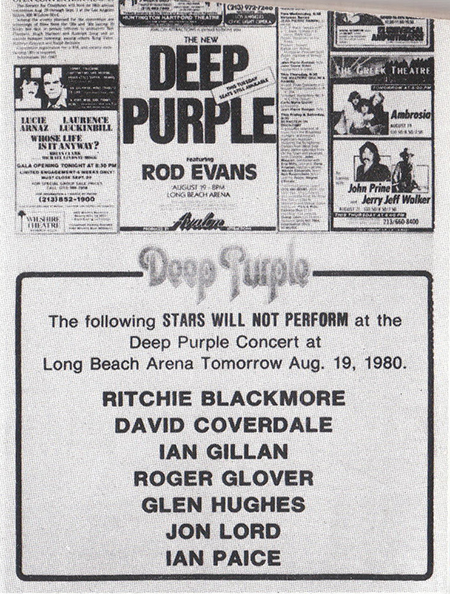Your Cart is Empty
Free shipping in the US on all orders $50+
Free shipping in the US on all orders $50+

Welcome back to part two of the insane story of the Bogus Deep Purple. In Part One, we discovered how Rod Evans was coaxed into joining a “new” version of Deep Purple with hired hand musicians. In Part Two, we’ll cover the band’s disastrous tour and the outcome of the lawsuit that ended them.
With their new line-up of “Deep Purple” finalized, promoter Steve G. and co. started booking shows in earnest. For venue promoters who didn’t know any better, snagging a Deep Purple reunion gig was a coup. And, while it seems strange now, in the days before the internet, there was little way of verifying whether the people ostensibly representing the Purps were the real deal. Steve G.’s people clearly put on a good enough front, as shows were booked at a number of notable venues across the US, Canada and Mexico.
But, they could only pull the wool over peoples’ eyes for so long. When the group played their first gig at the Civic Center, Amarillo Texas on May 17th, 1980, punters weren’t fooled by the Bogus Deep Purple. As the tour went on, audiences were disgruntled, with some shows ending in riots. Watching the footage that exists of Bogus Deep Purple (taken from a Brazilian TV report about the band), it’s not hard to see why. Their meat and potatoes take on “Smoke on the Water” is more bar band than arena rock, while Rod Evans’ limited vocal range never soars to the heights of either Coverdale or Gillan.
By the time the band hit California’s Long Beach Arena in August, word of the new, unauthorized Deep Purple had filtered back to the real band’s management. And they were taking steps to stop the imitation group.
Their first step was to clarify who exactly was (or rather wasn’t) in this new version of Deep Purple. When the Bogus group played California’s Long Beach Arena in August 1980, the real Purple’s representatives took out a half page advert in the L.A. Times (right next to the Long Beach gig listing) informing prospective gig goers that...

“The following STARS WILL NOT PERFORM at the Deep Purple Concert at Long Beach Arena Tomorrow, Aug. 19, 1980.
RITCHIE BLACKMORE
DAVID COVERDALE
IAN GILLAN
ROGER GLOVER
GLEN HUGHES (SIC)
JOHN LORD
IAN PAICE”
The next step was legal action. And as Rod Evans was the only member of the band who received booking royalties and had rights to the name Deep Purple, the buck stopped with him. Evans was sued for damages of $672,000 (around $2 million in today’s money) for using the band name without permission. Unable to pay the amount, he was required to forfeit all future royalties from albums and singles recorded by the Mark I Deep Purple lineup.
According to Ian Paice, Purple themselves never made any money from the lawsuit, nor did they intend to. As keyboardist John Lord stated (via The Highway Star), they went after Evans to protect the name of the band:
“What price would you place on your reputation and on the right of the public not to be sold something under false pretences?... I did not enjoy having to appear in court against a guy I'd once worked with - but he who steals my purse steals trash; he who steals my good name takes everything I have."
Four years after Bogus Deep Purple, the celebrated Mark II iteration of the real band reunited for a new album and world tour, reaching a new generation of fans. For Rod Evans, though, it was all over. While Evans hoped the new version of Deep Purple would restart his singing career, it effectively ended it. As any future earnings he made from performing would have to be paid towards the lawsuit, he’d never be able to earn a living from gigging again.
Did you ever see the real Deep Purple? Do you have any memories of the bogus band? Share your stories in the comments.
Of all the famous musicians in history, you will likely never find another of the likes of Frank Zappa.
From playing the bicycle on the Steve Allen Show to psychedelic rock with The Mothers of Invention to the years of compositional rock n’ roll madness, attracting the best of the best musicians to play in his band (likely because they’re the only ones who can pull off his music).
It’s safe to say that some of the most influential musicians in the 1960s came from Britain. The list sure backs up that fact: Eric Clapton, Jimmy Page, Jeff Beck, Pete Townshend, Peter Green, Richie Blackmore, John Lennon, George Harrison, and I can go on and on and on...
Notice, though, that I said musicians, not just guitarists. There are many heroes to be found for every instrument, particularly with our focus for this piece: the drums.


